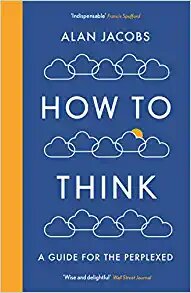
To Think or Not to Think
If I had read Alan Jacobs’ biography before reading a review of one of his books, I might not have read that book. I’m a secular humanist. He’s a Christian, a professor at a Baptist university–Baylor–a university in my mind that’s a right-wing-Bible-thumper factory. Technically, he falls under the category Repugnant Cultural Other, or RCO, an acronym borrowed from anthropology that he uses in his book How to Think: A Guide for the Perplexed. It’s possible that simply because of a superficial biography–gleaned from scanning his website before the book arrived at my doorstep–if I were to meet or even debate him, I might automatically resort to Refutation Mode; I’d be ready to argue, ready to fight without listening to what he might have to say about his faith–I couldn’t imagine anything he said about thinking to be of value. That’s the nature of Refutation Mode.
“[I]n Refutation Mode there is no listening,” he writes. “Moreover, when there is no listening, there is no thinking. To enter Refutation Mode is to say, in effect, that you’ve already done all the thinking you need to do, that no further information or reflection is required.”
It sounds shallow to decide a book’s merit based solely on a writer’s faith, or lack thereof. (To be fair, Jacobs is Anglican, not Baptist, and doesn’t seem like a Bible-thumper at all.) Except, it’s something we thinking persons do frequently, whether debating religion, politics, or plagues–especially online. But when we encounter RCOs, it’s almost reflexive to go into Refutation Mode. Jacobs himself sometimes succumbs to Refutation Mode. “But . . . I realized that I too am regularly tempted to enter Refutation Mode–and the more passionate I feel about a topic, the more likely I am to succumb to the temptation.”
So, why didn’t I automatically jump into Refutation Mode when it came to reading Jacobs’s book? As I say, I was, in part, inspired to read it when I read a brief review from Dr. Michael Eades, whose seminal book on low-carb dieting, Protein Power, I’ve also been reading. And, in truth, that review was hardly a review; it’s almost a non-review. But this sentence “Alan Jacobs, the author of How to Think, takes a different look at critical thinking than any I’ve seen before” intrigued me. I have a fondness for critical thinking and like learning to think better; I wanted to know what made this book so different, so interesting.
Moreover, Jacobs is clearly a bibliophile, as I discovered from my superficial scanning of his website. His most recent book, for example, Breaking Bread With the Dead: A Reader’s Guide to a More Tranquil Mind, seems to have a compelling premise: reading books from the past, even when they might offend, can somehow bring peace of mind. Makes sense. For me, reading is one of the few sources of pleasure that quell anxieties.
So, despite his faith, we have common ground. The love of reading. The love of books.
But, he also seems to share a concern about our current divisiveness. In a review of the book, Kelly Jane Torrance notes that on his blog Jacobs writes “the chief impetus of this book was the ever-increasing hostility and (often malicious) misunderstanding of one another that became one of the chief themes of the 2016 presidential election here in the U.S. and of the debate over the Brexit referendum in the U.K.”
Refutation Mode seems like a default, especially online, an arena where discourse seems perpetually either/or–you’re either with us or against us–even when that discourse comes from proponents of critical thinking, reason, and evidence-based thinking. Even thinkers don’t really think. Which is, according to Jacobs the “fundamental problem,” not necessarily the need to overcome bias, a need many prominent thinkers like Daniel Kahneman suggest is the key to better thinking.
“[W]e suffer from a settled determination to avoid thinking,” Jacobs writes. “Relatively few people want to think. Thinking troubles us; thinking tires us. Thinking can force us out of familiar, comforting habits; thinking can complicate our lives; thinking can set us at odds, or at least complicate our relationships, with those we admire or love or follow. Who needs thinking?”
Thinking, really thinking takes time; it’s slow, as Jacobs notes, and we take greater pleasure in taking socially approved attitudes, often the socially approved attitudes of our peer groups. No matter how much we might think we’re independent thinkers, our thinking tends to bind to one strand of thought or another. We think with others. This isn’t necessarily a bad thing, according to Jacobs, though it can at times lead to dark unthinking places–to unthinkingly following, for example, a charismatic leader into the depths of hell.
We bind ourselves to certain strands of thought or social attitudes because thinking, really thinking, is also risky. “To think, to dig into the foundations of our beliefs, is a risk, and perhaps a tragic risk,” Jacobs writes. “There are no guarantees that it will make us happy or even give us satisfaction.”
That’s a heavy risk to take. You might change your mind. You could lose friends or family–though how many friends have you blocked or unfriended on social media or even in real life because they didn’t hold the same social attitudes as you? Not thinking is risky too. Perhaps riskier. You could also discover something of great value or change your mind yet again, because thinking, really thinking, as Jacobs concludes, has no endgame.
“To cease thinking, as Thomas Aquinas explained,” Jacobs writes, “is an act either of despair–‘I can’t go any further’–or of presumption–‘I need not go any further.’ What is needed for the life of thinking is hope: hope of knowing more, understanding more, being more than we currently are.”